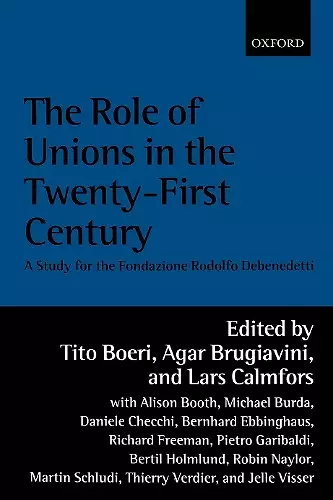The Role of Unions in the Twenty-first Century
A Report for the Fondazione Rodolfo Debenedetti
Lars Calmfors editor Tito Boeri editor Agar Brugiavini editor
Format:Paperback
Publisher:Oxford University Press
Published:16th Aug '01
Currently unavailable, and unfortunately no date known when it will be back
This paperback is available in another edition too:
- Hardback£75.00(9780199246571)

In this book, first-rate international scholars in the field explore the role that unions are likely to play in the changed economic environment of the new century. Questions discussed include: What will unions look like in the years to come? Which kind of interest groups will they represent? How important will be the broader political role of unions? To what extent do unions care about future generations? Part One documents a tendency towards greater decentralization in collective bargaining and declining union membership rates in most European countries. The process of decentralization may only be partly reversed by social pacts of the type that occurred in several EU countries in the run-up to EMU. Yet this type of co-ordination is likely to be increasingly unstable in a context where membership is falling, hence will inevitably require government intervention. Not all governments may wish to intervene in wage setting, however, as there are strong reasons to believe that such intervention could impose wage rigidities in some parts of the economy and lead to non-enforcement in other parts. Moreover, under EMU what matters is ultimately co-ordination of bargaining at the pan-European level rather than simply at the national level. Such higher-level, transnational co-ordination is not likely to occur for a long time to come because of the huge costs that it involves. Some transnational co-ordination may occur within multinational firms, however, as costs are likely to be much lower at this level. Part Two characterizes the intergenerational conflicts present within unions. Unions may be able to better respond to the needs of the unemployed without losing the support of current employees when they become involved in the running of unemployment benefit systems, as has been the case in those countries applying the so-called Ghent system. They may also succeed in making the system more efficient by, for example, contributing to the reduction of moral hazard problems associated with the provision of unemployment insurance. Unions are, however, unlikely to solve the latent conflict between their younger and older members in a context where the population is ageing, since they tend to preserve the status quo when it comes to cutting pension benefits in order to deal with demographic transition. The cost of these dynamic inefficiencies may be accepted by...
... a scholarly volume of interest to anyone concerned with the future of European unions, and whose discussion of organized labour's approach to the welfare question should become a central reference point. * Work, employment and society *
ISBN: 9780199246588
Dimensions: 233mm x 156mm x 17mm
Weight: 484g
320 pages